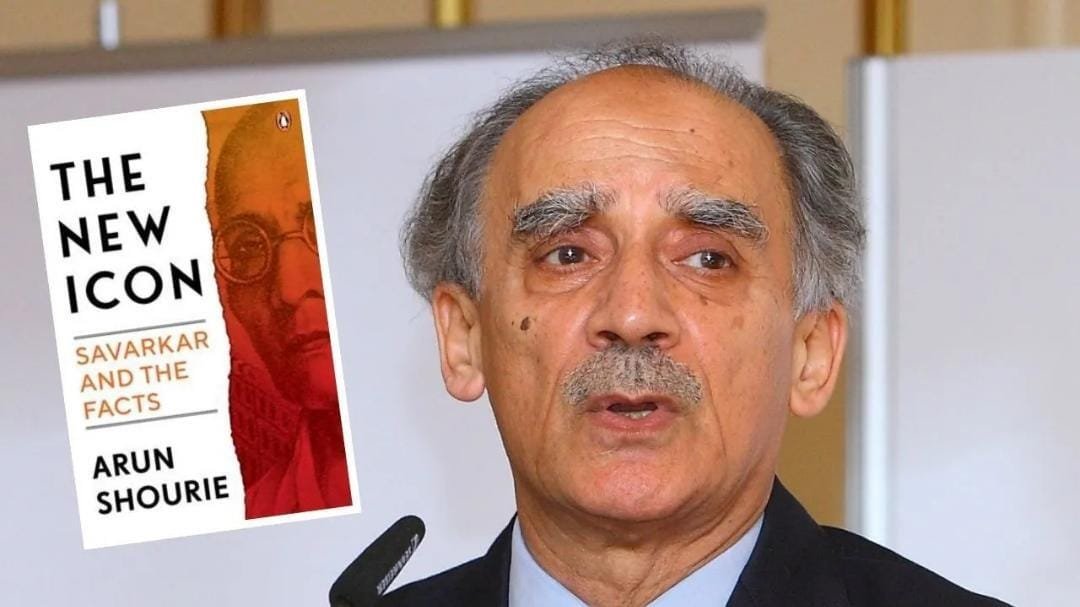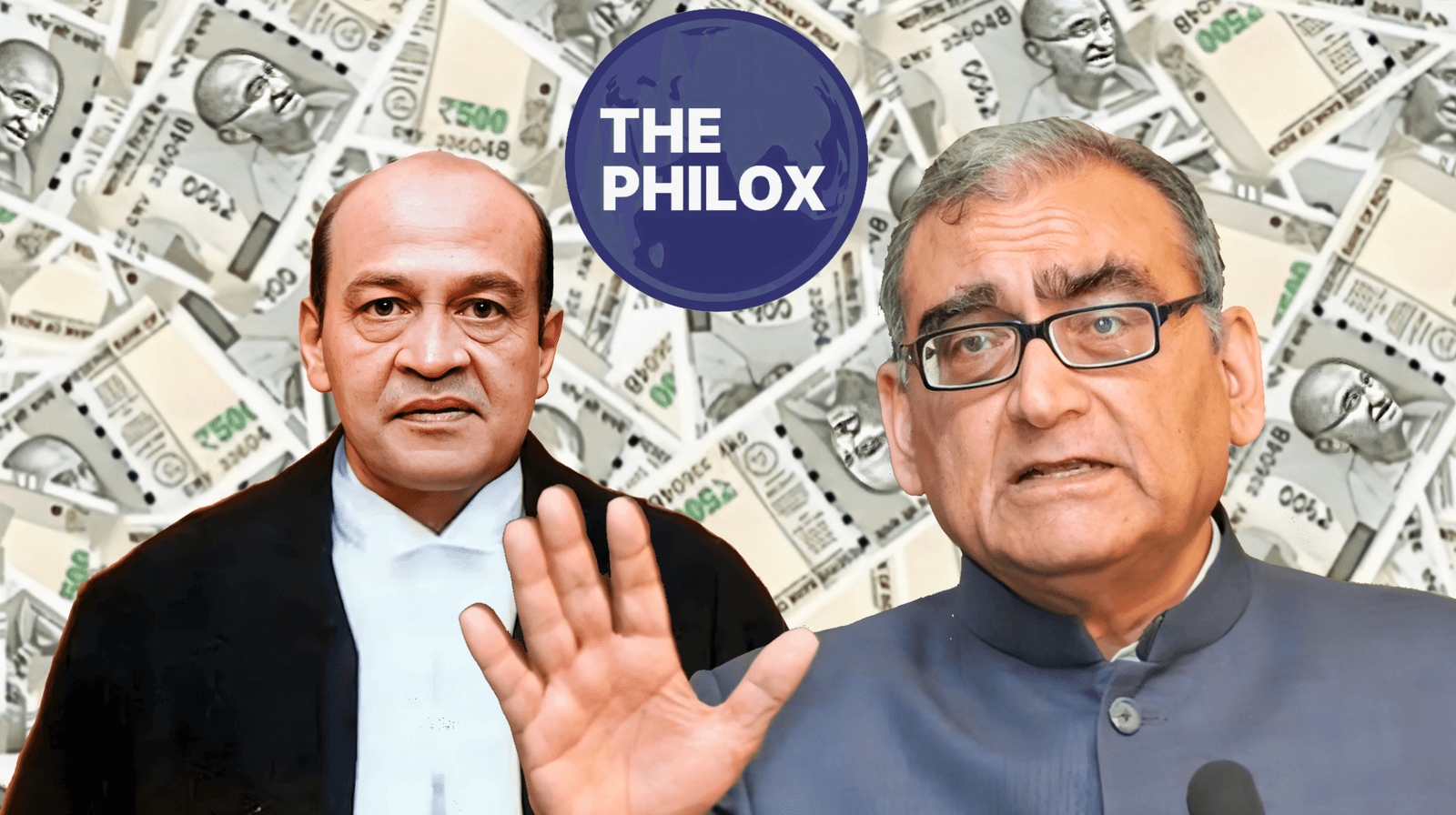Former minister in the BJP government of Atal Behari Vajpayee and veteran journalist Arun Shourie has authored a study of V. D. Savarkar the ideologue of the Hindu Mahsabha, mentor of the assassin of Mahatma Gandhi and contemporaneously the guru, the icon of Hindu communalists and ultra-nationalists which can only be described as a masterpiece.
Savarkar is nowadays idolized as the true Indian nationalist while Gandhi, Nehru and other Congress leaders are damned as compromising appeasers of Muslims who agreed to the partition of India. Does such a portrayal of Savarkar stand the test of evidence and facts? Shourie undertakes a massive examination of the existing source material to find out what the truth is.
He quotes a verse of Kalim Ajiz:
Hum Kuchh nahin kehtey, koi kuchh nehin kehtaa
Tum kyaa ho tumhee sab se kehalvaaye chalo ho….
(We say nothing, nobody says anything
You, yourself are making everyone say what you are)
The author has adopted this research strategy and methodology—he relies primarily on what Savarkar himself wrote and said, and then comparing it with official documents and contemporary records to ascertain if Savarkar’s assertions and the claims of those building him up today are valid. A more rigorous and objective analysis is not possible. I was very pleased because this was exactly the approach I adopted in my study of Mohammad Ali Jinnah and his words and writings were contextualized in the light of relevant official documents. Such a strategy leaves little or no scope for ambiguity about a public figure’s role in politics.
We learn that Savarkar was deeply exercised by the divisive nature of the caste system and the superstitions prevalent in the social life of Hindus. He ridiculed the worship of the cow, banning its meat consumption and drinking its urine and eating its dung as if they had healing medicinal properties, arguing that such matters should be left to science and doctors to determine. However, while adopting such a bold and uncompromising standpoint on such matters, Savarkar was quite capable of fabricating “facts”, inventing them and hiding the true facts—about himself, about events of his time as well as history. While initially celebrating Hindu – Muslim unity during the uprising of 1857 which he called as India’s War of Independence he was later to become an inveterate hater of Muslims.
Savarkar nurtured revolutionary ideas and prescribed violence to achieve higher ends – the supremacy of Hindus and Hinduism over others. However, when it came to facing the consequences of his violent mantras, he always ensured that he himself was not caught red handed. For example, in 1909 while in London he instigated a young student Madan Lal Dhingra to murder a British officer who had been invited to attend their function as a guest but kept himself away. He sent 20 pistols clandestinely to India. With one of the pistols the British collector of Nasik city Mr Jackson who was a respected Sanskrit scholar was killed. Later, Nathu Ram Godse and Apte—who adored Savarkar and were member of organizations and edited publications patronised by Savarkar—met him just before leaving for Delhi to assassinate Gandhiji. Savarkar was arrested along with others. During the trial he lied point-blank that he and Gandhi were close friends, that they lived together in India House in London, that they worked together as comrades. Through a minute forensic analysis, Shourie demonstrates that every bit of such claims was a complete fabrication. In fact, Gandhiji was not in London at that time at all.
At any rate, Savarkar was arrested and sent to India to face trial for involvement in the conspiracy to murder Jackson. He was sentenced to life imprisonment and sent to the notorious Cellular jail on the Andaman Islands. In his own account of those days, Savarkar graphically details the inhuman, harsh, unbearable life in the jail and blames the Muslim jailers for cruelty as well as for trying to convert Hindus to Islam. He does not blame the Irish head jailer as the main culprit for his suffering. He omits mentioning that he pleaded several times for mercy and assured the British that he had given up revolutionary violence and was eager to adapt himself to benign British rule, and to be of use to the British rulers. His underlying argument was that Hindus and the British should join hands to thwart the threat posed by Turko-Afghan fanatics. He went on to say: ‘I am ready to serve the Government in any capacity they like…. The Mighty alone can afford to be merciful and therefore where else can the prodigal son return to the parental doors of the Government?’ (p. 117).
These petitions by Savarkar have been in the public domain for quite some time but some of his supporters have claimed that Gandhi advised him to submit such mercy petitions. Shourie demonstrates with incontrovertible evidence that Gandhi had nothing to do with Savarkar’s mercy petitions. Moreover, the author underlines that more than 400 hundred political prisoners who did not write mercy petitions were hanged and many committed suicide.
Savarkar was finally paroled in 1922. In 1923 he published “Hindutva” which dichotomized Hindus and Muslims as two antagonist nations. His account of ancient and medieval Indian history was written grossly distorting facts with the explicit intention of serving the higher cause of Hindu supremacism.
Once all restrictions on him were removed Savarkar began secretly to lobby British officialdom for patronage of Hindus against Muslims. With the outbreak of World War II, he met Viceroy Linlithgow and repeatedly offered help in thwarting the Congress, He went on a campaign to recruit Hindus into the British army. To get some loaves and fishes for his men, he diluted one goal after another which he was proclaiming in public, ending his letters with ‘your obedient servant’’. While the Congress demanded independence for India, he was willing to accept dominion rule whenever the British deemed India was fit for it.
However, publicly in his writings and speeches Savarkar preached revolutionary overthrow of the government and the establishment of the Hindu Rashtra. Linlithgow saw through the contrast, and described in vivid detail which Shourie excavates from British records the contrast between what he was saying in private and what he was proclaiming in public. In exasperation, he gave up dealing with the double-dealing ‘little man’.
We also learn that Savarkar relished revenge and blood spilling against enemies of Hindus (read Muslims) taking his cue from Nazi Germany’s way of dealing with Jews. He urged that Hindus be ‘super-cruel’, ‘super-cunning’ in dealing with Muslims.
In the end, Shourie argues that Savarkar’s Hindutva is a clear and present threat to deeper Hinduism which is about an inner search, about humility, forgiveness, accommodation and separation of state and religion. He warns that the Hindutva ideology will become the very ‘Islamic State’ which Savarkar and his current devotees denounced.

By Dr Ishtiaq Ahmed
Professor Emeritus of Political Science, Stockholm University; Honorary Senior Fellow, Institute of South Asian Studies, National University of Singapore. Latest publications, Jinnah: His Successes, Failures and Role in History, New Delhi: Penguin Viking, 2020 won the English Non-Fiction Book Award for 2021 at the Valley of Words Literary Festival, Dehradun, Indian; innah: His Successes, Failures and Role in History, Vanguard Books, Lahore 2021; Pakistan: The Garrison State, Origins, Evolution, Consequences (1947-2011), Karachi: Oxford University Press, 2013; and, The Punjab Bloodied, Partitioned and Cleansed, Karachi: Oxford University Press, 2012- It won the Best Non-Fiction Book Prize at the 2013 Karachi Literature Festival and the 2013 UBL-Jang Groups Best Non-Fiction Book Prize at Lahore and the Best Book on Punjab Award from Punjabi Parchar at the Vaisakhi Mela in Lahore, 2016. I can be reached at: billumian@gmail.com




